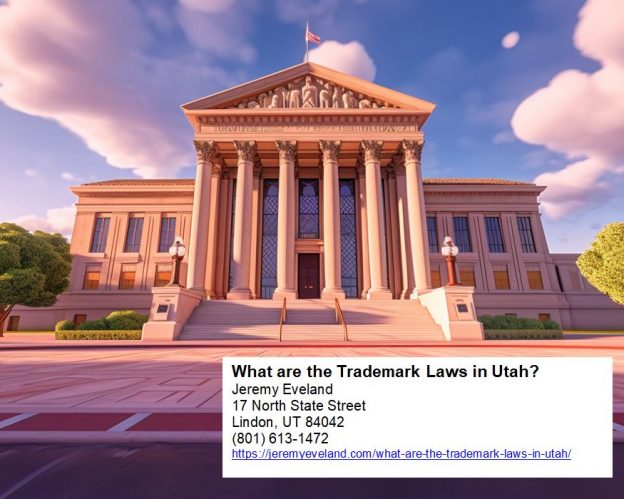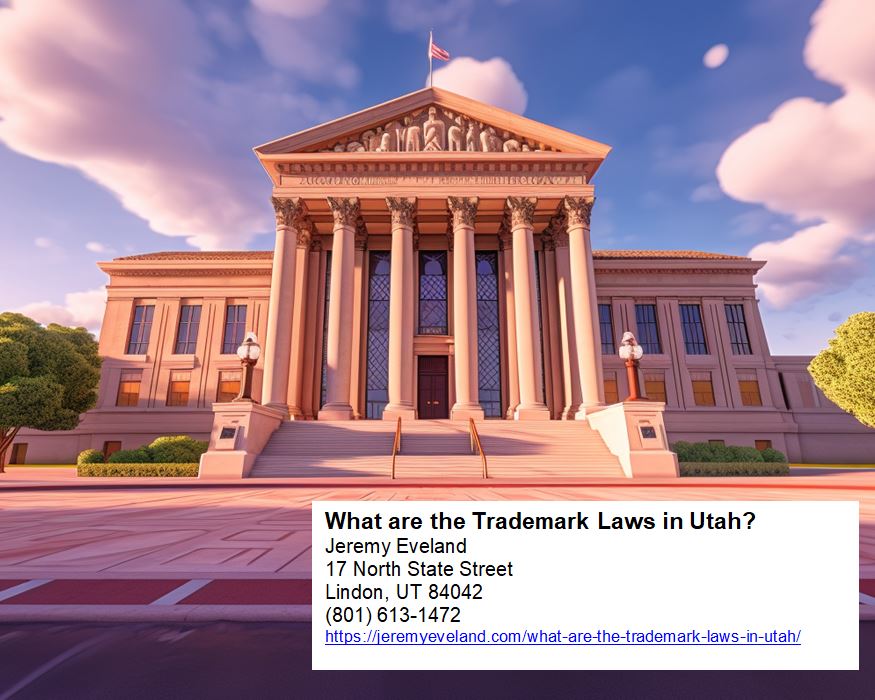The Utah Code has an entire section devoted to Trademark Law. You can find it at Utah Code Section 70-3a-101 et. seq.
Protecting intellectual property is critical for businesses to maintain their competitive edge and achieve success. A trademark is a type of intellectual property that identifies and distinguishes the goods or services of one seller from those of others. In Utah, as in other states, trademark laws protect the owners’ exclusive rights to use their trademarks and prevent others from using them without permission.
Explanation of Trademark Laws
Trademark laws govern the registration, use, and infringement of trademarks in Utah. These laws aim to prevent confusion among consumers about the source or quality of goods or services offered by different businesses.
Essentially, they give business owners legal protection against others who try to use similar marks that might cause confusion among consumers. Trademark laws apply equally to both registered and unregistered trademarks in Utah.
A registered trademark provides greater protection than an unregistered mark since it gives the owner exclusive rights to use that mark within the state. However, even if a trademark isn’t registered with the state government, it can still be protected under common law.
The Importance of Trademark Laws in Utah
Having strong trademark laws helps foster a healthy business environment in Utah by ensuring fair competition among businesses and protecting consumers from fraud or deception caused by confusingly similar marks used by different businesses. Without these laws, companies would have difficulty establishing brand recognition since anyone could use the same name or logo while selling a similar product or service.
This would lead to consumer confusion and ultimately harm both businesses involved. Additionally, without legal protection provided by trademark laws, it would be much more difficult for businesses to take action against counterfeiters who produce fake versions of their products under their brand name.
Understanding and adhering to trademark laws is essential for any business operating within Utah’s borders. It helps create a level playing field for all businesses, promotes fair competition, and ultimately protects the interests of both consumers and business owners.
Overview of Trademark Laws in Utah
If you have a business or brand in Utah, it is essential to understand the state’s trademark laws. A trademark is a symbol, word, phrase, design, or combination of these elements that identifies and distinguishes the source of goods or services. Trademarks are essential for protecting your intellectual property and preventing others from using your brand identity without permission.
Definition of a trademark
In Utah, a trademark is defined as “any word, name, symbol or device (or any combination thereof) used by a person to identify and distinguish his or her goods from those manufactured or sold by others.” This definition extends beyond physical goods to include services such as advertising and entertainment.
Types of trademarks recognized in Utah
Utah recognizes various types of trademarks:
-
Trademark:
a mark used to identify goods.
-
Service Mark:
a mark used to identify services.
-
Certification Mark:
a mark used by someone other than the owner certifying the origin or other characteristics of the product.
-
Collective Mark:
a mark indicating membership in an organization.
Registration requirements for trademarks in Utah
While registration is not required for a valid trademark under Utah law, there are significant benefits to registering your trademark with the state. To register a trademark in Utah, you must submit an application with the Secretary of State’s office.
The application requires specific information about your business and brand identity. Once submitted, your application will be examined by the Secretary of State’s office for compliance with statutory requirements.
If approved, your registration will last five years before requiring renewal.
Overall, understanding trademark laws in Utah is crucial for protecting and preserving your brand identity. By registering your trademark, you can ensure that your business is protected from infringement and unauthorized use by others.
Benefits of Registering a Trademark in Utah
Protection against Infringement and Unauthorized Use
One of the most significant benefits of registering a trademark in Utah is the protection it provides against infringement and unauthorized use. By registering your trademark with the Utah Department of Commerce, you obtain legal ownership of your mark and can take legal action against anyone who uses it without your permission.
This means that if someone else tries to use a similar or identical mark, you have legal recourse to stop them from doing so. Moreover, registration provides notice to the public that you have an exclusive right to use that particular mark.
This means that anyone who wants to use a similar or identical mark must seek your permission first. Otherwise, they risk infringing on your rights and facing legal consequences.
Exclusive Right to Use the Mark in Commerce within the State
Another benefit of registering a trademark in Utah is gaining exclusive right to use that mark in commerce within the state. This means that once your trademark is registered, no one else can use it for similar goods or services without your consent.
Having this exclusive right ensures that you are not competing with others using an identical or confusingly similar mark, which could lead to market confusion and lost profits. Additionally, owning this exclusive right gives you an edge over competitors by allowing you to differentiate yourself in the marketplace.
Ability to Sue for Damages and Obtain Injunctions Against Infringers
If someone infringes on your registered trademark rights in Utah, then you are entitled by law to sue them for damages and obtain injunctions against them. Damages may include actual damages (profits lost due to infringement), statutory damages (up to $2 million per counterfeit mark per type of goods sold) and attorneys’ fees.
An injunction is another remedy available under Utah trademark laws where an order from the court commands the infringer to stop using your mark in commerce. An injunction is an effective mechanism to put an immediate stop to infringement and prevent further damage.
Preserve and Enhance Your Reputation
Another benefit of registering your trademark in Utah is that it helps you preserve and enhance your reputation. Your trademark represents your business, product or service, and its reputation is vital for its success.
Unlawful use of your mark can hurt that reputation in the market and cause significant damage to your business. By registering your trademark, you can protect it against unauthorized use, which helps you maintain control over how it’s used by others.
It also gives you a legal tool to enforce the proper use of your mark and take action against anyone who misuses it. By doing so, you can enhance the credibility of your brand in the marketplace.
Requirements for Registering a Trademark in Utah
To register a trademark in Utah, there are specific requirements that must be met. These requirements are put in place to ensure that only legitimate trademarks are registered, and to provide clear guidelines for the registration process.
One requirement is that the mark must be distinctive. This means that it cannot be too similar to an existing trademark or too generic.
A distinctive mark is one that sets apart the goods or services associated with it from those of other businesses. Examples of distinctive marks include made-up words or names, logos with unique designs, and slogans with original phrasing.
Another requirement is that the mark must be used in commerce within the state of Utah. This means that the goods or services associated with the mark must have been offered for sale or used in some way within Utah.
Eligibility criteria for registration
To be eligible for registration, a trademark must meet certain criteria beyond being distinctive and used in commerce within Utah. The owner of the trademark must also have legal standing to apply for registration; typically this means they either already own rights to the mark through prior use, licensing agreements, assignment agreements, etc., or they intend to use it soon after receiving registration approval. Additionally, trademarks cannot contain immoral or scandalous content according to state law; nor can they falsely suggest endorsement by a government entity or any other entity they’re not associated with.
Application process and fees
The application process begins with submitting an application via paper mail or online through Utah’s state IP office’s website (http://www.ip.utah.gov). The application requires specific details about the trademark including but not limited to: name of applicant(s), description of goods and/or services associated with this mark (specify class(es) relating your goods/services), date first used anywhere (or date first used interstate commerce), whether the trademark is currently in use, and a clear specimen of the mark.
There is also a filing fee to be paid upon application submission. The current fee as of 2021 is $70 on a per-class basis, though this may change over time.
Examination process and timeline
After submitting an application, it will be reviewed by an examining attorney from the state IP office. The examination process can take anywhere from several months to over a year, depending on various factors such as workload and complexity of the trademark in question. If there are any issues with the application or any concerns about potential conflicts with other trademarks that have already been registered or applied for, the examining attorney will communicate with the applicant to resolve these issues.
Once all requirements have been met and no conflicts remain, the trademark will be published in Utah’s official gazette for public review and opposition (if applicable). If there are no oppositions filed within 30 days after publication, then your mark becomes registered.
Infringement and Remedies under Utah Trademark Law
Definition of infringement under Utah law
Infringement occurs when a third party uses a trademark that is identical or similar to a registered trademark without the owner’s authorization. Utah law recognizes both direct infringement and contributory infringement.
Direct infringement is when someone uses the trademark in connection with goods or services that are identical, related, or materially similar to those of the registered trademark owner. Contributory infringement is when someone knowingly provides goods or services that are used to infringe another’s trademark rights.
Available remedies for trademark infringement
Trademark owners who establish that their rights have been infringed can seek various remedies under Utah law, including injunctions, damages, and attorneys’ fees. An injunction may be granted by a court order directing the infringer to cease all unauthorized use of the registered mark.
In addition to injunctive relief, monetary damages can be awarded for actual damages suffered by the plaintiff as well as any profits made by the infringer. In some cases, punitive damages may also be awarded.
Defenses against infringement claims
Defendants accused of trademark infringement can defend themselves in several ways. One defense is fair use – using someone else’s mark in a descriptive manner or comparative advertising while not creating confusion with customers about who owns the mark.
Another common defense is that there was no likelihood of confusion between their use and the registered mark – if they were selling different products than those covered by the registration, for example. Another defense would be to challenge validity claims regarding trademarks – if they claim that it wasn’t distinctive enough to qualify for registration in Utah or whether there were prior trademarks already existing in Utah State before your registration date.
Defendants may argue laches if they believe that too much time has passed since you learned about their alleged infringement, and they are now prejudiced. In this case, the court may refuse to hear your claim because you delayed too long in bringing it to their attention.
The Importance of Proper Legal Representation
Trademark infringement can be a complicated legal issue, and it’s crucial to have a skilled attorney who is well-versed in Utah trademark law to represent you. An experienced lawyer can provide guidance on how best to protect your intellectual property rights and pursue remedies for infringement. They will also be able to advise you on the most suitable defense strategies in case of accusations of trademark infringement against you or your company.
Trademark laws help protect businesses from losing their identity due to unfair competition from other businesses. With proper registration of trademarks in Utah, businesses can legally secure ownership over their name, symbol or logo.
If any infringement occurs, there are legal remedies available under Utah law that can help protect business owners’ interests and bring justice for the wrongs inflicted on them by infringers. With a good understanding of the trademark laws outlined above, individuals should appreciate the importance of acquiring legal representation and following due process when it comes to protecting their intellectual property rights within Utah State.
Recapitulation of Key Points on Trademark Laws in Utah
Trademark laws in Utah are a set of legal provisions that protect the rights of trademark owners and regulate the use of trademarks in commerce. These laws provide exclusive rights to trademark owners to use their mark in connection with goods or services, and prevent others from using identical or confusingly similar marks. In Utah, trademarks can be registered with the State’s Department of Commerce, which provides additional legal protection and benefits for trademark owners.
To register a trademark in Utah, a person must meet certain eligibility criteria, file an application with the State’s Department of Commerce, pay a fee, and go through an examination process. Once registered, trademarks provide several advantages to their owners including protection against infringement and unauthorized use, the exclusive right to use the mark in commerce within the state, and the ability to sue for damages or obtain injunctions against infringers.
Importance of Protecting Your Intellectual Property Rights Through Registration
Trademarks are valuable assets that can represent significant investments in branding and marketing efforts. Registering a trademark provides legal protection against infringement by others who may try to benefit from your hard work.
Without registration, your ability to protect your brand is limited by common law rules which can be more difficult and costly to enforce. Registering your trademark also allows you to expand into new markets without fear of infringing on someone else’s rights.
It ensures that you own all rights associated with your brand name or logo within the state where it is registered so that you can take appropriate action if anyone tries to copy it or trade on its reputation. Protecting your intellectual property rights is crucial for any business owner looking to build a successful brand.
Registering a trademark under Utah law gives you an exclusive right over its usage within the state while providing numerous benefits such as preventing unauthorized use and infringement. By understanding these laws and taking proactive steps to protect your brand, you can ensure that your business continues to thrive for years to come.
Areas We Serve
We serve individuals and businesses in the following locations:
Salt Lake City Utah
West Valley City Utah
Provo Utah
West Jordan Utah
Orem Utah
Sandy Utah
Ogden Utah
St. George Utah
Layton Utah
South Jordan Utah
Lehi Utah
Millcreek Utah
Taylorsville Utah
Logan Utah
Murray Utah
Draper Utah
Bountiful Utah
Riverton Utah
Herriman Utah
Spanish Fork Utah
Roy Utah
Pleasant Grove Utah
Kearns Utah
Tooele Utah
Cottonwood Heights Utah
Midvale Utah
Springville Utah
Eagle Mountain Utah
Cedar City Utah
Kaysville Utah
Clearfield Utah
Holladay Utah
American Fork Utah
Syracuse Utah
Saratoga Springs Utah
Magna Utah
Washington Utah
South Salt Lake Utah
Farmington Utah
Clinton Utah
North Salt Lake Utah
Payson Utah
North Ogden Utah
Brigham City Utah
Highland Utah
Centerville Utah
Hurricane Utah
South Ogden Utah
Heber Utah
West Haven Utah
Bluffdale Utah
Santaquin Utah
Smithfield Utah
Woods Cross Utah
Grantsville Utah
Lindon Utah
North Logan Utah
West Point Utah
Vernal Utah
Alpine Utah
Cedar Hills Utah
Pleasant View Utah
Mapleton Utah
Stansbury Par Utah
Washington Terrace Utah
Riverdale Utah
Hooper Utah
Tremonton Utah
Ivins Utah
Park City Utah
Price Utah
Hyrum Utah
Summit Park Utah
Salem Utah
Richfield Utah
Santa Clara Utah
Providence Utah
South Weber Utah
Vineyard Utah
Ephraim Utah
Roosevelt Utah
Farr West Utah
Plain City Utah
Nibley Utah
Enoch Utah
Harrisville Utah
Snyderville Utah
Fruit Heights Utah
Nephi Utah
White City Utah
West Bountiful Utah
Sunset Utah
Moab Utah
Midway Utah
Perry Utah
Kanab Utah
Hyde Park Utah
Silver Summit Utah
La Verkin Utah
Morgan Utah
What are the Trademark Laws in Utah Consultation
When you need help with Trademark Laws in Utah call Jeremy D. Eveland, MBA, JD (801) 613-1472 for a consultation.
Jeremy Eveland
17 North State Street
Lindon UT 84042
(801) 613-1472
Related Posts
Corporate and Business Law in Utah
Does Starting My Own Business Mean I Get A Corporation Automatically?
Impact of Environmental Regulations on Business Law Compliance
Business Lawyer South Jordan Utah
Business Lawyer Millcreek Utah
Business Lawyer Taylorsville Utah
How Artificial Intelligence is Shaping the Future of Business Law
Estate Planning is Crucial for People of All Income Levels
Navigating Legal Challenges in Business Succession Planning
Business Lawyer Bountiful Utah
How To Structure A Merger Or Acquisition In Utah
How To Hire Employees Legally in Utah
10 Tips for Negotiating Lease Agreements
Business Lawyer Spanish Fork Utah





